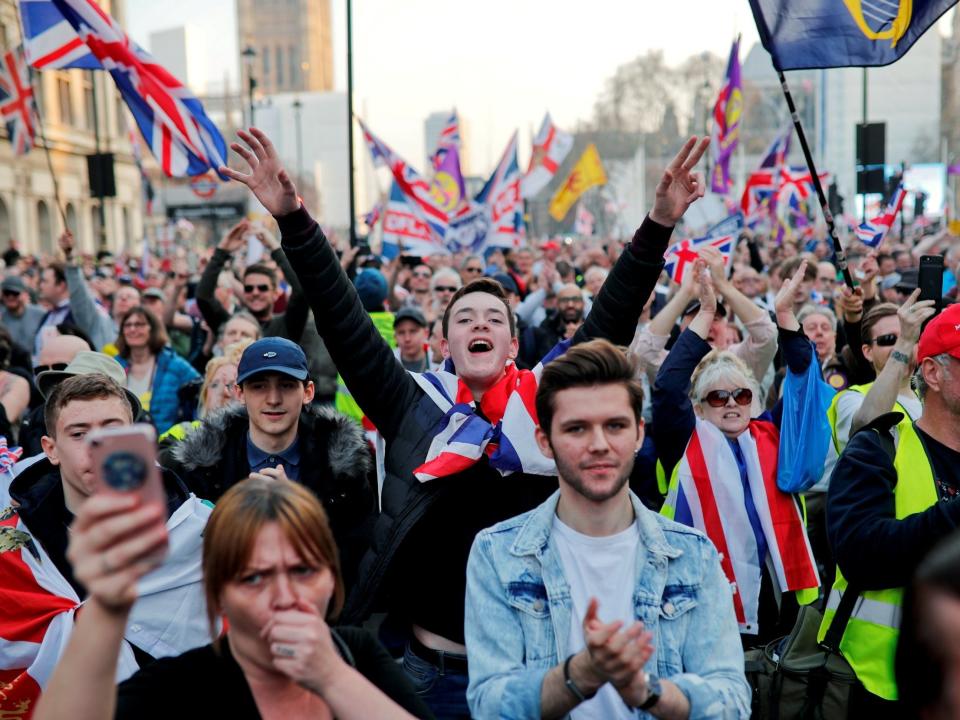We still haven’t acknowledged the overwhelming whiteness of Brexit
If all the world’s a stage, then Brexit is the Shakespearean tragedy that simply won’t end. Every time we think this nightmarish play is on its last act, the playwrights sadistically add another plot twist that only elongates this painstaking process. But who are the playwrights, the actors and the directors in this hellscape? Who takes centre stage?
These questions have deeply contested answers – but I can tell you who isn’t even allowed into the theatre: for nearly three years 8 million Bame (black, Asian, and ethnic minority) people in the UK have been met with nothing more than empty platitudes, and as of yet, little has changed.
Since the thundering wrath of the public at Jon Snow’s comment about the number of white people at the Leave Means Leave rally in March, it is clear that people aren’t quite ready to discuss the remarkable whiteness around Brexit.
As someone who is campaigning with the people’s vote movement, I have had to take a step back and ask: why aren’t there more people that look like me in this campaign? Many Leave campaigners relish pointing out the alleged middle class and white nature of the campaign; and whilst hypocritical, these claims are not necessarily untrue.
However, it is not as simple as many people would like to pretend. The existence of groups like Ethnic Minorities for a people’s vote is testimony to the fact that there is a concerted effort from Bame activists and the people’s vote movement itself to champion diversity and inclusion. But these efforts are frequently met with an uncomfortable silence. This issue clearly transcends the people’s vote campaign specifically, and speaks to a problem that plagues the political landscape across this country.
Bella Frimpong and Tanya Arackal, both Bame activists within the people’s vote campaign, have told me of the frustration that they felt within the movement because of the lack of urgency in recruiting Bame voices.
Arackal described the explicit racism she has experienced since the referendum, including people calling her a p*ki and telling her to “go home” on social media. This has been the devastatingly ordinary reality for so many people of colour in the wake of 2016; recorded hate crimes increased by 17 per cent to 94,098 in 2017. This is a 123 per cent increase since 2013. The dismissal of Bame experiences has real consequences.
Frimpong expressed exasperation in recalling an event that she was invited to speak at as an EU citizen. The woman coordinating the event incredulously said “I thought you were meant to be Italian”. She demanded Bella say something in Italian to, I assume, prove her Italian-ness. Apparently, the idea of a black woman also being Italian was just a little too much for her to understand.
Kobe Bibbon, another activist with Our Future Our Choice (OFOC) and young candidate for councillor in Manchester has voiced his concerns to me about this, stressing that we need to focus on the most marginalised communities. Because if we won’t, who will?
Any economic hit as a result of Brexit would hit our communities the hardest. Industries like the clothing sector and jobs on production lines will be the most affected by Brexit and are dominated by ethnic minorities. Bame communities are more likely to be in lower paid, precarious jobs and generally have less savings. There is plenty of evidence to show that Bame communities are among the most vulnerable to economic disruption; but this is rarely discussed.
The truth is, a network of politically engaged and conscientious Bame activists exists. We need to do more to appeal to them. That means, as Kobe and other Bame activists have said, talking candidly about the continuing role of racism and xenophobia in Brexit. This means talking about Bame EU citizens, hate crime, and the disproportionate economic toll Brexit will take on Bame communities.
It isn’t just a moral issue – it would be a tactical mistake to exclude such a significant proportion of voters. Whilst the “heavyweights” of the Leave campaign continue to promise a nostalgia-fuelled vision of Britain harking back to empire and expansion, we need to propose a forward-looking and positive image of our future that celebrates inclusion and diversity.
The people’s vote movement is doing great things, but the exclusionary problem that riddles most areas of political life in this country must be actively tackled.
Diversity does not naturally happen in a society that does not value it. The need to appeal to a broad base should not come at the expense of the people that make this country the multicultural melting pot that we are trying to preserve.
We need to be more vigilant, give Bame activists a larger megaphone, and talk about issues which affect the most vulnerable in society.
Nimo Omer is a student at Manchester University, and an OFOC activist

 Yahoo News
Yahoo News 

